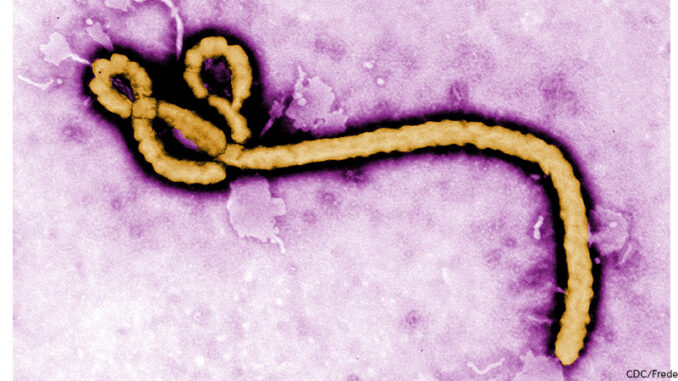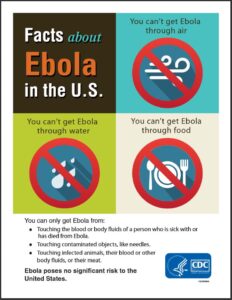
Back in the summer, btw brought you news of an outbreak of Ebola. In the months since, thousands have died and concern over how to both treat victims and stop the rapid spread has grown.
What began in West Africa has now officially spread to the United States. A Liberian man named Thomas Duncan had been exposed to a neighbor who had died of Ebola in Liberia. Duncan, who was not exhibiting any symptoms and did not realizie he had been infected himself, traveled to Dallas, Texas. Duncan reportedly lied on airport questionnaire that asked if he had had any recent contact with anyone with Ebola. By the time he did display symptoms and was properly diagnosed, he had been in contact with dozens of people, possibly infecting them. Duncan died, Wednesday, October 8.
Amid all of the flurry of news surrounding this world health crisis, btw aims to make some sense by clarifying the basics.
What is Ebola?

Although it is a disease that presents with flu-like symptoms (fever, body aches, headache, sore throat, diarrhea and vomiting), Ebola is a severe illness that attacks the inner organs and often leads to death. It’s name come from a river in the Democratic Republic of Congo where its first outbreak was found back in 1976. The disease is originally contracted to humans through contact with infected animals such as chimpanzees, fruit bats and a certain breed of antelope. Some of these animals are regularly eaten by people in Africa. Infected persons then transmit the disease through direct contact with their bodily fluids.
To be treated for Ebola, patients must be quarantined (completely isolated) so that they do not transmit the disease to anyone else. Many healthcare workers have already been infected. Those participating in burial rituals where it is customary to touch the body of the deceased are also contracting the disease. So far, nine out of ten people who have contracted Ebola have died, making it “one of the world’s deadliest diseases.” There is also no known cure or vaccine. More than 5,300 people around the world have contracted Ebola and more than 2,600 have died.
Can I Get It?
According to the director of the Centers for Disease Control (CDC), an agency of the U.S. government, the chance of contracting Ebola in the United States is extremely unlikely. This is because those carrying the disease are not contagious during the “incubation period” (the time it takes an organism to fully develop in its host). In addition, Ebola–unlike chicken pox or the measles–cannot be transmitted through the air, but only through bodily fluids. Urine, blood, vomit and feces are the most highly infectious bodily fluids, but the CDC warns against saliva, sweat, semen, tears and breast milk as well.
What’s Next?
The reasons why people in places like West Africa are suffering and why there is less concern about an outbreak in the U.S. is because of the difference in healthcare. Hospitals in the United States are significantly better equipped to isolate and treat potential victims. Like many third-world countries, hospitals in West Africa have been overwhelmed and ill-equipped to deal with this crisis. Additionally, sanitation and the ability to maintain sanitary conditions are so much better in the United States than in these areas of West Africa that are dealing with Ebola’s spread.
Outside help and financial aid is pouring into the region. Among the givers are Bill and Melinda Gates (Microsoft’s founder and his wife). The Bill & Melinda Gates Foundation charitable organization recently pledged $50 million to support an “emergency response to Ebola.” The donation is the largest ever toward a humanitarian cause. The money will go toward the strengthening of healthcare systems as well as research into the long-term implications of this epidemic.
